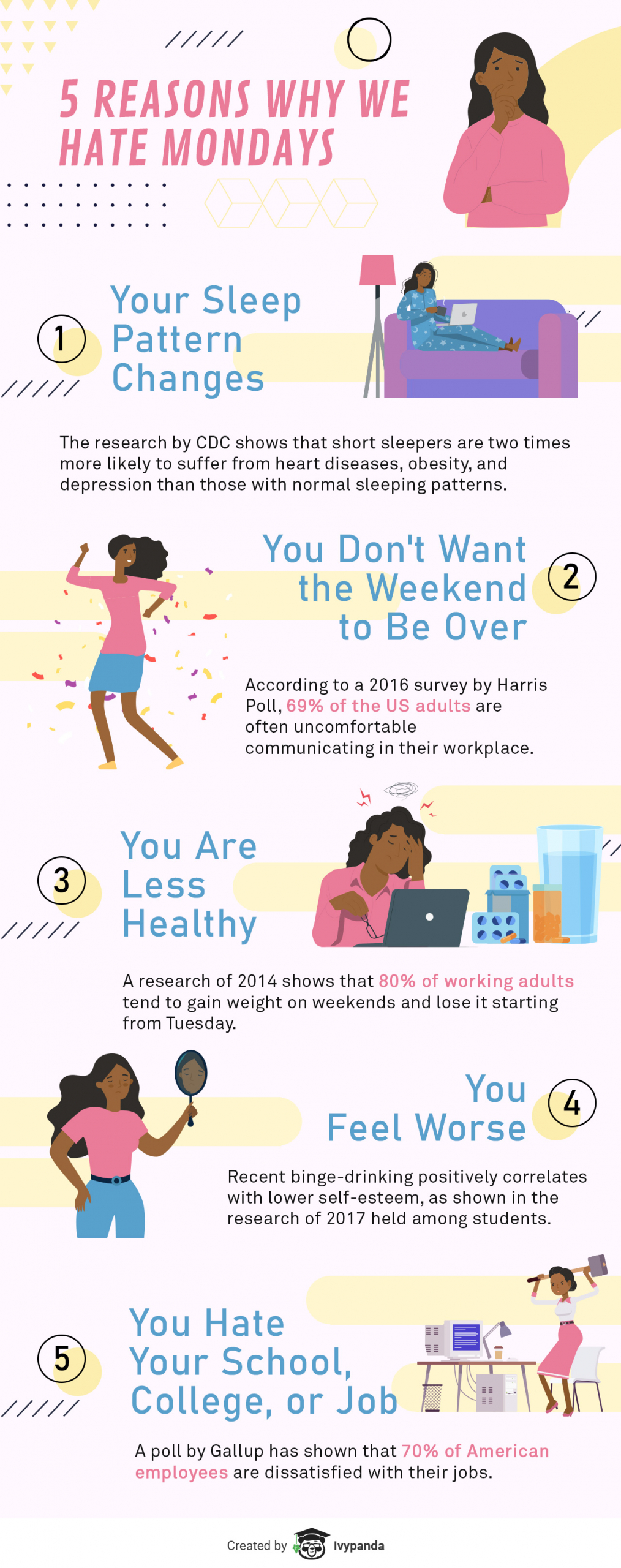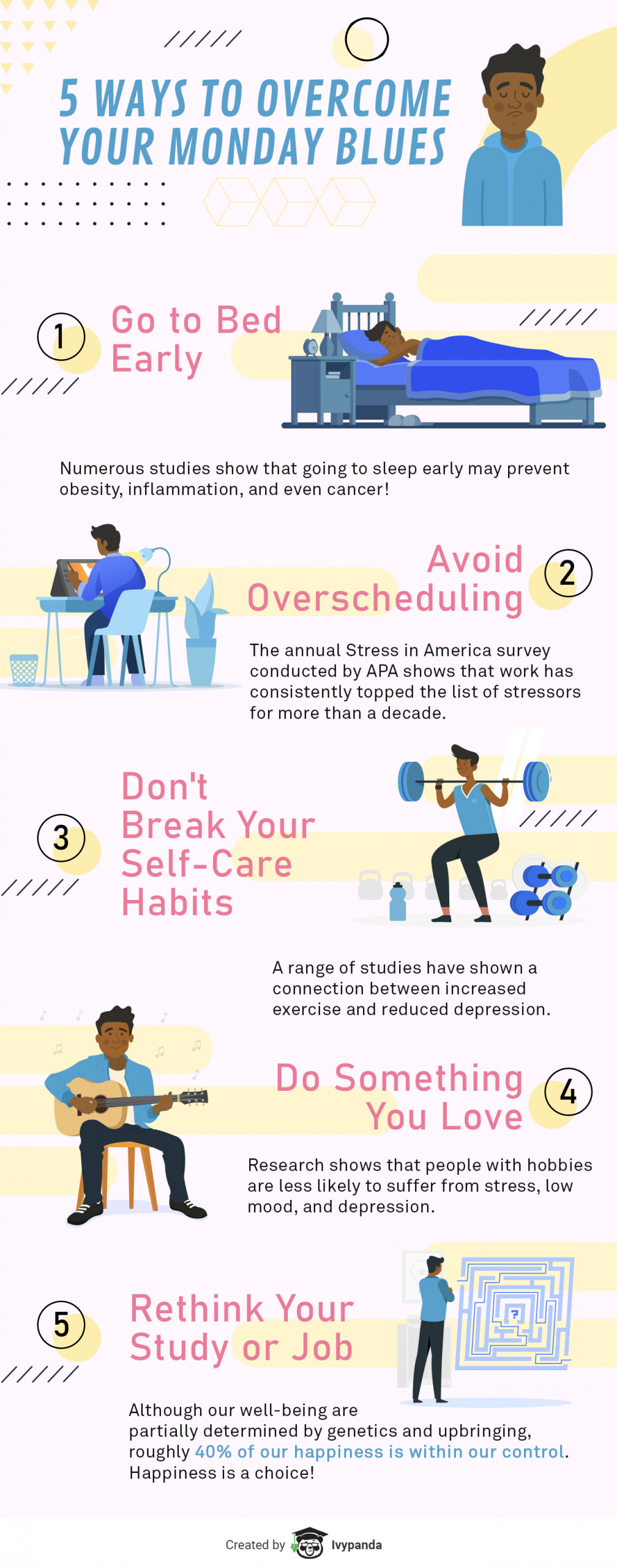If a Monday morning reminds you of a cup of fresh coffee, your weekly planner, and inspirational thoughts of productivity, you are a unique person. Unfortunately, the Monday blues are so wide-spread that they have become a cultural phenomenon.
If you feel depressed, annoyed, overwhelmed, sluggish, and tense at the beginning of a working week, you are probably dealing with a case of the Monday blues. Monday is the first day of the working week worldwide, except for the GCC countries, where people go to work on Sunday, or even Saturday, in some instances. For most of us, though, this familiar lethargic feeling happens to us on Monday.
❓ What Is the Meaning of Monday Blues?
Having the Monday blues means that you wake up feeling sad, low-spirited, and run down on Monday morning. This phenomenon generally affects students, workers, and employees who have a five-day working week. Returning to work can annoy and depress people, leaving them unmotivated.

Considerable research has been carried out to test whether people’s behavior is affected by specific days of the week. The findings of these studies confirm that the Monday blues is not just a figure of speech. An experimental study at Emporia State University has shown that people tend to be more depressed on Mondays than Fridays. They are less likely to incur risks and more likely to avoid spending money.
The University of Melbourne has published an article about Mondayitis. This illness cannot be found in medical textbooks, but research has revealed that heart dysfunction is most likely to happen on Mondays. This generic term comprises chest pain, heart attack, and abnormal heart rhythms. In addition to Mondays, heart problems are more common during colder seasons, natural disasters (i.e., earthquakes or tornados), world soccer or football tournaments, and terrorist attacks. All these situations are stressful for the human body. Unfortunately, Mondays come more often than World Cups or earthquakes. They create chronic stress that heightens the risk of cardiac dysfunction. These problems become more frequent with aging, but health can be undermined in young people, too.
However, students are the most vulnerable group to Mondayitis. A psychological study revealed that the summary of university students’ daily moods indicated a large Monday blues effect. Meanwhile, married men who did not study at a university experienced a lighter effect and a larger mood variance. According to these findings, one could assume that the difference in the moods of married men on Mondays depends on how exciting and motivating their work is. Respectively, students’ stress levels are very high and leave little energy for enjoying their studies.
People tend to underestimate minor continuous stress. Constant pressure wears away a stone, not to mention a complicated biological system like a human being. The Monday blues don’t end on Tuesday. The phenomenon lasts until Friday evening, to a lesser degree. But days off do not provide full-fledged relief. On Saturday, people start to feel anxious about the upcoming Monday, and on Sunday, they begin to stress. Anxiety can cause some people to remain in bed all weekend and prevent them from doing more active and engaging activities. This vicious circle requires a thoughtful solution.
😡 5 Reasons Why We Hate Mondays
There is almost no difference between a Sunday and a Monday. Both days can be enjoyable or painful. We often hate Mondays not because we hate our schools, colleges, or jobs. Rather, our weekend/weekday lifestyles are so dramatically different from each other that this psychological shift is highly unpleasant for us.

Your Sleep Pattern Changes
If you have ever traveled by plane far enough to experience a two-hour time change or more, you know how difficult it is to readjust to a new sleeping schedule. Unfortunately, few people consider how much stress their bodies suffer every Monday morning. On weekends, you wake up without an alarm clock, but on Monday, you force your body to shift to a new “time zone.”
This problem has been widely studied by scientists and was even given a name: “social jetlag.” The longer people oversleep on the weekend, the larger the difference between their normal rise time on weekdays. Still, early-risers tend to suffer less from social jetlag, as found in morningness research. That is why changes to your sleep patterns are highly detrimental to human health and should be avoided. Keep reading to find out how to resolve these challenges.
You Don’t Want the Weekend to Be Over
Contemporary people are merely cavemen who moved from caves to large buildings made of concrete and glass. We are social animals who feel happy in a “tribe.” If you feel that the only people who understand and appreciate you are your family and friends, you will always wake up depressed on Monday mornings.
Successful modern companies are aware of their employees’ need to be engaged in communication at a deeper level than just work issues, so they arrange team-building events and other social activities. However, not every job can provide the luxury of relaxed chatting. So, in this case, people replenish their need for human interaction on weekends. On Sunday night, we know the fun is over, so we often get depressed. But if you have a good friend at work, this change will become less noticeable.
You Are Less Healthy
You’re not making up your symptoms; people are actually less healthy on Mondays. Heart attacks are more common, and people even weigh more on Mondays than other weekdays. During the weekend, our meal size increases, and physical work decreases (we sleep more, remember?), so that sluggish feeling on a Monday morning has nothing to do with Monday itself.
Moreover, we seem to be more concerned with a healthy lifestyle at the beginning of the working week. Google Trends data shows that searches on health-related issues peak on Mondays. The reasons may be twofold. First, we often promise ourselves to start a new life (exercise, diet, etc.) next week. Second, as mentioned above, people really do feel worse and often search the web for their symptoms.
You Feel Worse
In addition to excessive meals, Sunday evenings are often used for other unhealthy stress-relievers, such as alcohol and smoking. Furthermore, in an attempt to extend the pleasure of a weekend and postpone the working week, people go to bed later than usual on Sundays. All these factors make the Monday blues a physiological condition, not a psychological one.
We can aggravate this “Monday hangover” with the decision to become a better person, as we discussed in the previous point. A diet is also a stress to the body, even if it is a healthy one. You will start feeling its positive effect over time, but the first day will be far from pleasurable. Thus, if you need to develop a healthy habit on Monday, do some preparatory work during the weekend.
You Hate Your School, College, or Job
Finally, this is the most serious reason and the hardest one to change. A global poll carried out by Gallup has shown that only 15% of full-time workers around the globe (about one billion people) are engaged by their work. The situation is better in the U.S., where around 30% of workers report being engaged. Still, it means that 70% of American employees aren’t engaged. The reasons may be endless, but the result is just one: 70% of people dislike their job.
The situation with school and college studies is no better: 20% of students reported bullying at college, as this literature review found. Others have conflicts with teachers and peers or do not enjoy certain subjects. Changing a school, college, or job because of interpersonal issues is difficult to do and unlikely to occur.
💆 5 Ways to Overcome Your Monday Blues
Although it may require some time, effort, or changes to your habitual lifestyle, these problems can be resolved. The next five points provide a comprehensive solution to the Monday blues to ensure enjoyable mornings throughout the working week.

Go to Bed Early
The early bird can catch more than just a worm. However, to make early rising less painful, you need to go to bed before midnight. Getting eight hours of sleep is the standard, so note the time when you need to wake up and subtract eight hours to get the time when you need to fall asleep. But evening showers and preparing to go to bed are also time-consuming tasks, so subtract at least half an hour more. Set an alarm clock for your bedtime and follow through with your plan. You’ll enjoy the feeling of getting enough sleep every night.
Developing a structured morning routine will also help you go to bed earlier. Knowing that you have to run a few miles at 6 A.M. to keep up with your exercise goals will motivate you to plan your evening accordingly.
Avoid Overscheduling
For a smooth transition from a relaxing weekend to a busy Monday, plan fewer activities for the first day of the working week. If you attend additional courses or participate in sports, try to schedule them during the middle of the week. If some personal meetings cannot be arranged for weekends, plan them for Friday evening.
Some people benefit from writing down a plan for the upcoming week on Sunday evening. In such a way, you can figure out how to distribute your work throughout the week. Big tasks look easier if divided into smaller, more manageable parts, so your motivation and productivity will also benefit from such a practice. Using additional resources like our essay database may also increase your efficiency of dealing with assignments.
Don’t Forget about Your Self-Care Habits
While trying to develop healthy and productive habits, do not forget about the ones you already have. Having a strict schedule during the week doesn’t do much good if we break it every weekend. In part, Mondays are so hard because we leave normal sleeping, eating, and exercise habits behind on Friday evening.
Therefore, try to balance your weekend and weekday lifestyles: sleeping hours, fun, rest, and work. It is often better to study a couple of hours on Saturday to make the week less packed. Similarly, never leave all the laundry and cleaning for the weekend. Your weekend will just turn into another working day without any rest. Find the least busy day during the week and do some of your chores then.
Do Something You Love
Make your mornings something to look forward to. This will motivate you to go to bed earlier, and also make Monday mornings less disappointing. Many people read before going to bed. However, reading several pages with a cup of coffee every morning sounds pretty nice, too. You can break the monotony and start your day with something more interesting than just cleaning your teeth (although you shouldn’t forget about this!).
If your schedule allows, dedicate Monday evenings to the things you enjoy doing. Distribute your assignments throughout the rest of the week to have some free time on this day. In this way, you will be more productive throughout the week and still be able to find an hour or two for your hobbies.
Rethink Your Study or Job
All of us have relatively the same level of luck, success, and failures in our lives. However, some people are happier than others. For the most part, the reason is their attitude. They are more likely to think about the pleasurable side of things than minor problems that often can be ignored or resolved after little contemplation.
Take time to recognize the things you appreciate about your studies or job. There is always something positive to find: pleasant people you interact with, an amiable atmosphere in class or your office, exciting assignments, etc. Focus on what you get, not on what it takes. Still, if you know that your degree is not the one for you, or if your job is poorly-paid and too stressful to bear, you might need to make a decision to radically change your life.
🤩 Have a Great Monday: Inspirational Quotes
All in all, Monday is just another day. You are the one who makes it enjoyable or daunting. Spend 15 minutes every Monday morning thinking about your overarching goals and writing down where you are at accomplishing them. You will get a bird’ s-eye view of your life. It is a highly motivating practice, especially at the beginning of the week, when we feel that we have six more days in reserve. The following quotes will also inspire you to make Monday morning a happy start to your week.

Mondays are the start of the work week which offer new beginnings 52 times a year!
David Dweck
Just one small positive thought in the morning can change your whole day.
Dalai Lama
Amateurs sit and wait for inspiration, the rest of us just get up and go to work.
Stephen King
You don’t have to be great to start, but you have to start to be great.
Zig Ziglar
Morning is an important time of day, because how you spend your morning can often tell you what kind of day you are going to have.
Lemony Snicket
If you have the right mindset, you can be just as happy on Monday as you are on Friday.
Joel Osteen
Be miserable. Or motivate yourself. Whatever has to be done, it’s always your choice.
Wayne Dyer
When you arise in the morning think of what a privilege it is to be alive, to think, to enjoy, to love…
Marcus Aurelius
Believe on Monday the way you believe on Sunday.
Rita Schiano
Spend eighty percent of your time focusing on the opportunities of tomorrow rather than the problems of yesterday.
Brian Tracy
Do not be embarrassed by your failures, learn from them and start again.
Richard Branson
If you want to make an easy job seem mighty hard, just keep putting off doing it.
Olin Miller
Start where you are. Use what you have. Do what you can.
Arthur Ashe
Every day is different, and some days are better than others, but no matter how challenging the day, I get up and live it.
Muhammad Ali
Either you run the day or the day runs you.
Jum Rohn
Optimism is a happiness magnet. If you stay positive, good things and good people will be drawn to you.
Mary Lou Retton
Life is 10% what happens to us and 90% how we react to it.
Dennis P. Kimbro
There are two types of people who will tell you that you cannot make a difference in this world: those who are afraid to try and those who are afraid you will succeed.
Ray Goforth
Your Monday morning thoughts set the tone for your whole week. See yourself getting stronger, and living a fulfilling, happier & healthier life.
Jameson Ferguson
Life begins at the end of your comfort zone.
Neale Donald Walsch
![How to Beat the Monday Blues [Ultimate Guide + Infographic]](https://ivypanda.com/blog/wp-content/uploads/2020/10/tired-black-woman-with-glasses-in-hand-rubbing-eyes-736x491.jpg)
![How to Choose a Major? Tips, Steps & Mistakes to Avoid [+Infographic]](https://ivypanda.com/blog/wp-content/uploads/2020/10/top-view-of-handshake-over-desk-with-keyboard-and-charts-309x208.jpg)


Well said. I liked your article. Everything you said is so true. I have already solved this problem. I remember when i was little when i went to school. Waking up on monday was the hardest thing to do especially if you had a good Weekend . Growing up i learned how to get rid of this bad habit and i followed some tips you mentioned in your article.
Good work !!
Best regards,
Steven Kendy Pierre.
Hello, Steven! We appreciate you taking time to write your feedback. It means a lot for us!
Well said. I liked your article. Everything you said is so true. I have already solved this problem. I remember when i was little when i went to school. Waking up on monday was the hardest thing to do especially if you had a good Weekend . Growing up i learned how to get rid of this bad habit and i followed some tips you mentioned in your article. Good work !!
When I was a little boy, i asked my wise grandfather for his thoughts on what i should do when I grow up. He said, “First find what you love to do most in life, then find a way to get paid for that.” So if you have the Monday Blues, it may be that you have chosen a job that you are no longer passionate about. Take some time and dream, do a reality check, and find your life purpose. I love Mondays because I get to do what i love.
Respectfully, Steven Bonacorsi
Glad to hear your opinion, Steven. Thank you for your feedback!